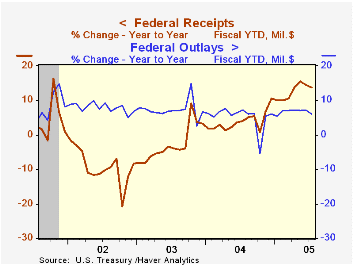 Global| Aug 11 2005
Global| Aug 11 2005U.S. Budget Deficit in July Reduced
by:Tom Moeller
|in:Economy in Brief
Summary
The U.S. federal government budget deficit of $52.8B in July that was somewhat shallower than Consensus estimates. The monthly deficit contrasted with a $69.2B deficit last July and during the first ten months of FY 2005 the deficit [...]

The U.S. federal government budget deficit of $52.8B in July that was somewhat shallower than Consensus estimates. The monthly deficit contrasted with a $69.2B deficit last July and during the first ten months of FY 2005 the deficit remained nearly one quarter lower than the prior fiscal year's first ten months.
Net receipt growth at 13.8% for the first ten months of FY05 continued to reflect the improved economy. Individual income taxes (44% of total receipts) rose 15.1% and corporate income taxes (10% of total receipts) rose 41.7%. The improved job market raised employment taxes (36% of total receipts) by 8.0%.
Federal outlay growth fell to 6.1% during the first ten months of FY05. Defense spending (19% of total outlays) grew 5.6% and Medicare spending (12% of total outlays) slowed to 7.5% growth. Growth in spending on social security (21% of total outlays) was about stable at 5.7% and spending on health programs (10% of the total) also was stable at 4.1%. Spending on education & training (4% of the total) grew 12.0% and interest expense (8% of the total) grew 12.3% with higher interest rates versus declines last year.
The latest from the Congressional Budget Office is available here.
| US Government Finance | July | June | FY '05 - YTD | FY2004 | FY2003 | FY2002 |
|---|---|---|---|---|---|---|
| Budget Balance | $-52.8B | $22.4B | $-302.6B | $-412.1B | $-377.6B | $-157.8B |
| Net Revenues | $142.1B | $243.8B | 13.8% | 5.5% | -3.8% | -6.9% |
| Net Outlays | $194.9B | $212.4B | 6.1% | 6.1% | 7.4% | 7.9% |
Tom Moeller
AuthorMore in Author Profile »Prior to joining Haver Analytics in 2000, Mr. Moeller worked as the Economist at Chancellor Capital Management from 1985 to 1999. There, he developed comprehensive economic forecasts and interpreted economic data for equity and fixed income portfolio managers. Also at Chancellor, Mr. Moeller worked as an equity analyst and was responsible for researching and rating companies in the economically sensitive automobile and housing industries for investment in Chancellor’s equity portfolio. Prior to joining Chancellor, Mr. Moeller was an Economist at Citibank from 1979 to 1984. He also analyzed pricing behavior in the metals industry for the Council on Wage and Price Stability in Washington, D.C. In 1999, Mr. Moeller received the award for most accurate forecast from the Forecasters' Club of New York. From 1990 to 1992 he was President of the New York Association for Business Economists. Mr. Moeller earned an M.B.A. in Finance from Fordham University, where he graduated in 1987. He holds a Bachelor of Arts in Economics from George Washington University.
More Economy in Brief
 Global| Feb 05 2026
Global| Feb 05 2026Charts of the Week: Balanced Policy, Resilient Data and AI Narratives
by:Andrew Cates






